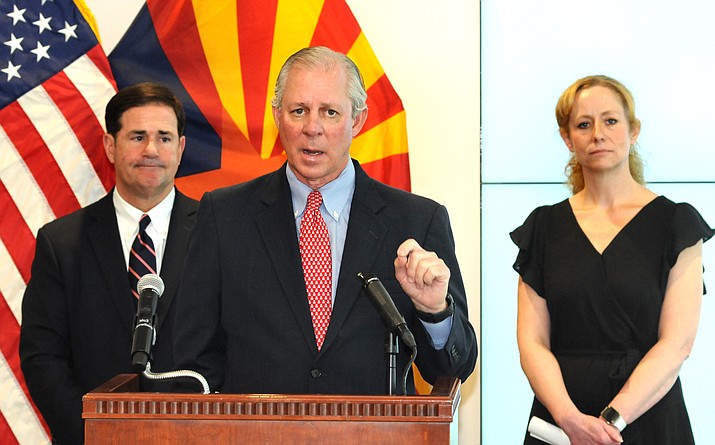UofA to offer optional coronavirus testing for all faculty, staff, students
PHOENIX -- The University of Arizona will be testing all its faculty, staff and students to see if they have antibodies showing they have had COVID-19.
UA President Robert Robbins said the testing is optional. And he said that no person will be denied admission or access to classrooms depending on the results.
But Roberts told Capitol Media Services that it will help the university determine what sort of protective measures they need to take -- if any.
Roberts, who is a medical doctor, said someone who shows a positive test likely is immune from getting the disease again. And that, he said, may allow a professor to decide he or she feels safe to teach from the front of a classroom when the university reopens again versus having to teach online.
Gov. Doug Ducey said that the first of the 250,000 tests the school is developing will go to "front-line medical personnel and first responders.''
But Robbins said that he hopes eventually to make the tests available to other state universities and, eventually, to larger communities.
None of this is a cure to the virus or even an indication that someone currently has an active case. That's because the antibodies do not develop until seven to 10 days later.
Still, Robbins said the information about who has contracted it can be helpful.
"Just think about the healthcare providers and the first responders who may have been sidelined and they don't know if they can go back to work yet,'' he said. "If they test positive for the antibodies they should be clear to go back to work.''
The theory is that once a person has warded off COVID-19 he or she will have antibodies that protect them against future infection.
Robbins said that has been the case with certain prior outbreaks of unusual diseases.
In the case of MERS -- Middle East respiratory syndrome -- he said those who recovered were protected for about a year. And for severe acute respiratory syndrome the antibodies provided about three years of protection.
Still, Robbins said, the research is yet to be done on COVID-19.
"We can't guarantee you'll have the immunity,'' he said.
"But we need to get the data because knowledge is power,'' Robbins continued. "We feel that empowering our students, our faculty and staff is really important.''
And there's something else that leads him to believe that there will be some immunity.
Robbins said researchers at the UA have been doing research on coronaviruses for two decades.
"Coronavirus is predictable in what it's going to do,'' he said. And he said both MERS and SARS are, in fact, coronaviruses.
"If we look at all the other coronaviruses ... you're conferred immunity for at least a year, maybe up to three years.
It was the idea of testing the UA community of 45,000 students and 15,000 staff, Robbins said, that led to him approaching Ducey about expanding the scope to up to 250,000.
"We'll be ready to go sometime next week, at the latest by May 1, to begin rolling this test out,'' he said. The university testing is being financed with private donations; the broader program will be funded with $3.5 million from the state.
Robbins said he sees significant academic benefit in finding out who in the UA community has had the virus.
"We want to segment people into different risk categories of students,'' he said.
"If we know that someone has immunity, or at least has a positive antibody test -- we're making a leap of faith that it does give you some immunity -- then it allows them to more freely come to class without potentially having to worry about contracting the infection,'' Robbins said. "Just imagine if you're a parent and you send your child away knowing that they're protected, they're not going to get COVID-19.''
He said, though, that does not mean that UA will have two separate categories of students when the school reopens, one with immunity and one without.
"Everybody's going to be welcomed back,'' Robbins said.
But what it does mean, he said, is that student who is at risk, perhaps because they have a compromised immunity system, will have "the highest degree of cautions.''
"But if you're a student who tests positive for the antibody, then you don't need the extreme things that we're going to do for those students,'' Robbins continued. "It's going to be a tiered mitigation strategy.''
On Twitter: @azcapmedia
SUBMIT FEEDBACK
Click Below to:




